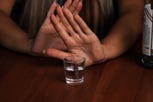Alcohol depresses the Central Nervous System (CNS), which plays a pivotal role in the coordination of activity and control of behavior. This is why excessive alcohol intake results in impaired judgment, movement and behavior.
Stopping your consumption of alcohol completely or going "cold turkey" after a prolonged period of drinking can cause your Central Nervous System to react adversely. It can result in unpleasant, and sometimes dangerous, physiological and psychological side effects including:
- anxiety
- nervousness
- tremors and shakes
- life-threatening seizures
Alcohol detox should always be medically supervised in order to ensure a safe withdrawal, or detoxification process.
The Process of Alcohol Detox
The process of going through alcohol detoxification results in a variety of symptoms that range from mild to severe. Mild withdrawal symptoms can include those that are typical of a hangover, including:
- headache
- nausea
- vomiting
- perspiration
- restlessness
- agitation
- loss of appetite
- insomnia
For the alcoholic who has been drinking heavily and consistently for a long period of time, more severe withdrawal symptoms can be expected, and may include:
- night sweats
- night terrors
- auditory or visual hallucinations
- convulsions
- the DTs (delirium tremens)
Fear of the alcohol detox process and the accompanying symptoms keeps many alcoholics drinking—long after they know they need to stop. However, it is important to take that first step toward recovery by entering an alcohol detox program where health care, support and guidance are provided to help you through the process.
Types of Alcohol Detox
There are three types of alcohol detox available at many detox facilities:
Cold Turkey
Cold turkey detox derived its name from the chills and goose bumps that arise during the process of withdrawal from alcohol, drugs or nicotine. People who try to stop cold turkey will just stop drinking alcohol altogether and “white knuckle” it through the withdrawal symptoms as they come. It's estimated that one in four people are at risk for a seizure if they choose to go cold turkey rather than receive medical care and support during alcohol detox.
Medical Detox
The safest form of alcohol detox is a medical detox. Individuals undergoing medical detox will receive mild prescription medication to help ease them through the most dangerous phase of alcohol detox where the potential for seizure is greatest. Hospitals or drug rehab centers that are state-licensed for medical detox offer these types of services.
Individuals undergoing the medical detox process receive medication in tapering amounts until their body is physically stabilized. Once they are stabilized after the detox process, they are able to enter an inpatient alcohol rehab program. The medical detox approach is the most prevalent—and comfortable—form of alcohol detox available.
Neurotransmitter Restoration Therapy (NTR)
Neurotransmitter Restoration Therapy (NTR) is a relatively new alcohol detox process offered by only a few select drug and alcohol rehab facilities in the United States. NTR utilizes an all-natural amino acid and mineral solution that is usually given to the patient via IV. The NTR solution enters the patients system and coats the brain’s neurotransmitter receptor sites where most of the damage from drug and alcohol abuse occurs.
During this type of detox process, the body’s cells are stimulated to shift into repair mode, easing withdrawal symptoms, cravings and the fogginess that can accompany alcohol detox. In spite of its benefits, NTR is generally combined with medical detox, because prescription medication is often necessary to ease alcoholic individuals past the danger stage when life-threatening convulsions can occur.
If you or someone you know is seeking help from addiction, please visit our directory of treatment centers or call 800-772-8219 to start the path to recovery today.








